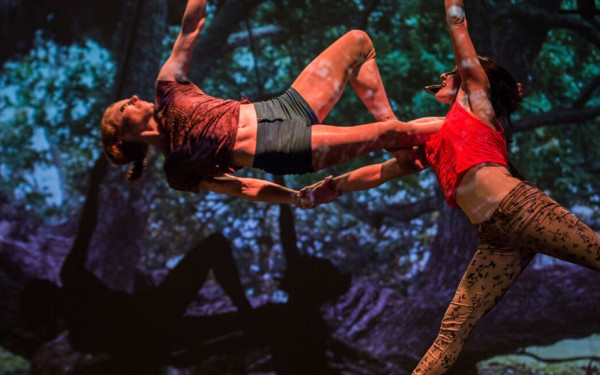Racially Diverse Acts Surge at Montreal’s Fringe Festival
Fringe Introduces Indigenous Land Acknowledgements and Says No to Censorship
Representation matters.
It’s especially true for people of Black, Indigenous and other racial minority communities.
And in this year’s 27th edition of the St-Ambroise Montreal Fringe Festival, luck played out.
With more than 100 original shows, a handful of production companies are bringing racial and cultural diversity to the festival’s stages, starting June 8.
“It’s fucking time,” said Amy Blackmore, the festival’s Executive and Artistic Director. “We’re really proud to see the content at the festival this year. I really feel like the role of Fringe is to create space for these kinds of trends in theatre.”
For the first time this year, the Fringe Festival will have Indigenous land acknowledgements at the start of each of its events.
Performances like Paani, Pluck’d and Love Painted Brown will tell stories of experiencing Islamophobia, growing up in an abusive immigrant household and an Indian-Mexican upbringing in an African-American home, respectively. Other plays also touch on issues surrounding class, gender, sexuality and mental health.
_900_780_90.jpg)
“For this year’s festival, it’s the most I’ve seen,” said Joseph Ste-Marie, veteran Fringe actor and photographer. “In past years, there have been a few [people of colour], but it’s slowly but surely growing.” Ste-Marie added that he hopes to see more as the demographic changes over time.
For actor Mercedeh Baroque—who will be performing in both Paani and Pluck’d —these are welcomed changes. However, she’s still unsure about how she feels about the festivals policies, or lack thereof, when it comes to filtering out offensive content.
She recalled a play in last year’s edition of the festival where an all-white cast dressed up in traditional, feudal Japanese clothing.
“This chick did yellowface,” explained Baroque. “She had the Geisha look and everything and she was just a white chick underneath it all.”
Baroque considers this to be a form of racism seeing how it reduced cultural features into objects or costumes.
“We cannot deny a production,” said Blackmore in regards to this. “Unless it is breaking the law, [we can’t do anything]. The whole idea of Fringe is that the work is 100 per cent uncensored.”
_900_720_90.jpg)
If audiences see something they like or dislike on stage, then Fringe encourages them to be vocal by commenting on social media using #fringebuzz, on the website and on paper at the festival’s base camp at Parc des Amériques.
The festival works by lottery, just like its national and international counterparts. Productions are chosen at random in the English-Language, French-Language, Canadian and International categories.
Some festival participants have floated the idea of creating a separate pool for production companies which have a significant presence of people with racially diverse backgrounds, but Fringe would rather opt for more outreach. Meaning, they want an increase of entries from minority communities in the lottery.
“What we did leading up to this year’s festival is—I think you can see it in the programming—we went out of our way to target different communities,” Blackmore said. “‘Hey, this is your festival as much as it’s everyone else’s festival.’”
Fringe had it’s launch on May 29, but the program will get into full swing on Thursday, June 8.
_900_779_90.jpg)
This year, show-goers can catch the following featuring this kind of diverse content at Fringe:
Love Painted Brown: Imagine eating naan burritos during Kwanzaa… That’s one way to sum up part of playwright/director Shanti Gonzales’s life. LPB promises laughter, tears and rage. Put together by angrybrowngirl Productions, the show deconstructs the Gonzales’s Indian-Mexican, living in an African American household. (Starts Thursday, June 8 at Montreal Improv Espace B, 3713 Saint-Laurent, Suite 202, $5 for students and members of the Quebec Drama Federation, $10 for general admission)
Paani: Blowfish Theatre’s latest is a mix of music, dance, spoken word and storytelling for the purpose of exploring Islamophobia and racism in North America. Be warned: audiences will leave feeling disturbed. (Starts Thursday, June 8 at Studio Multimédia du Conservatoire, 4750 Henri-Julien Ave., $7.50-$12.50)
Pluck’d: Concordia University undergrad Kě Xīn Li, through Bald Angry Asian Productions, shares their personal story of the cultural, linguistic and generation gaps that tear apart a Chinese immigrant family at a homecoming Christmas dinner. They would also like to share the following warning: Violence, Strong Language, White Guilt. (Starts Thursday, June 8 at Mainline Theatre, 3997 St-Laurent Boul., $10 or PWYC)
tldr;smh: Burcu Emeç brings “brown feminism, Kurdishness, survival, and resistance,” through a multi-disciplinary, one-”womxn” show by way of her Rojavan alter-ego, Lady Jîyan. (Starts Saturday, June 10 at Studio Multimédia du Conservatoire, 4750 Henri-Julien Ave., $10)
The Monkey King Gets His Staff: JingJu Canada presents the comedic and colourful adventure of Sun WuKong, the Monkey King, on his journey to the palace of the Dragon King of the Eastern Sea. Also, it’s put together by Concordia University Alumni who traveled to Beijing to train in Chinese Opera. (Starts Sunday, June 11 at La Chapelle Scènes Contemporaines, 3700 St-Dominique St., $8-$10)
St-Ambroise Fringe Festival // May 29 – June 18 // montrealfringe.ca

_900_600_90.jpg)
_900_465_90.jpg)




_600_375_90_s_c1.jpg)